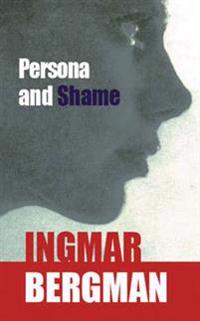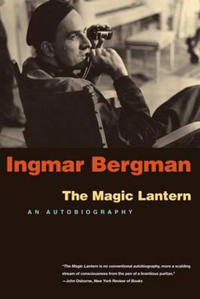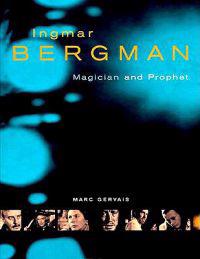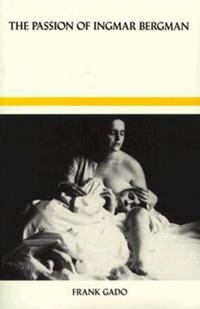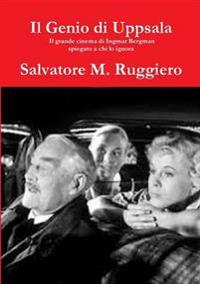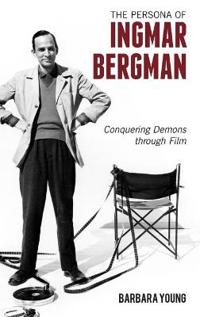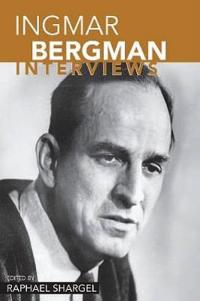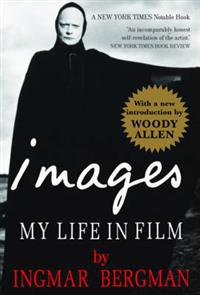Persona and Shame: The Screenplays of Ingmar Bergman (Häftad)
avIngmar Bergman
ISBN: 9780714507576 - UTGIVEN: 200203Ingmar Bergman is still the doyen of cinema. He is known for masterpieces of controlled human emotion, exploring every facet of the personality in relentless detail. He wrote: "I had the possibility of corresponding with the world around me in a language that is literally spoken from soul to soul."T[...]
Ingmar Bergman: Interviews (Inbunden)
avIngmar Bergman, Raphael Shargel
ISBN: 9781578062171 - UTGIVEN: 2007-08Cartas de Amor de Ingmar & LIV: La Hermosa Historia Entre LIV Ullman E Ingmar Bergman a Traves de 42 Anos de Romance y de Amistad. (häftad)
ISBN: 9781535052382 - UTGIVEN: 2016-07The Magic Lantern: An Autobiography (Häftad)
avIngmar Bergman
ISBN: 9780226043821 - UTGIVEN: 200705"When a film is not a document, it is a dream. . . . At the editing table, when I run the strip of film through, frame by frame, I still feel that dizzy sense of magic of my childhood." Bergman, who has conveyed this heady sense of wonder and vision to moviegoers for decades, traces his lifelong lov[...]
Ingmar Bergman's Face to Face
ISBN: 9780231176521 - UTGIVEN: 2017-09The 1976 premiere of Face to Face came at the height of director-screenwriter Ingmar Bergman's career. Prestigious awards and critical acclaim had made him into a leading name in European art cinema, yet today Face to Face is a largely overlooked and dismissed work. This book tells the story of its[...]
Ingmar Bergman's Face to Face
ISBN: 9780231176538 - UTGIVEN: 2017-09The 1976 premiere of Face to Face came at the height of director-screenwriter Ingmar Bergman's career. Prestigious awards and critical acclaim had made him into a leading name in European art cinema, yet today Face to Face is a largely overlooked and dismissed work.This book tells the story of its r[...]
Ingmar Bergman, Cinematic Philosopher (Häftad)
avIrving Singer
ISBN: 9780262513234 - UTGIVEN: 200910Known for their repeating motifs and signature tropes, the films of Ingmar Bergman also contain extensive variation and development. In these reflections on Bergman's artistry and thought, Irving Singer discerns distinctive themes in Bergman's filmmaking, from first intimations in the early work to [...]
Ingmar Bergman's The Silence
ISBN: 9780295801957 - UTGIVEN: 2011-07Ingmar Bergman's 1963 film The Silence was made at a point in his career when his stature as one of the great art-film directors allowed him to push beyond the boundaries of what was acceptable to censorship boards in Sweden and the United States. The film's depiction of sexuality was, as Judith Cri[...]
Sonatas, Screams, and Silence: Music and Sound in the Films of Ingmar Bergman
ISBN: 9780415840309 - UTGIVEN: 2015-09Sonatas, Screams, and Silence: Music and Sound in the Films of Ingmar Bergman is the first musical examination of Bergman s style as an auteur filmmaker. It provides a comprehensive examination of all three aspects (music, sound effects, and voice) of Bergman s signature soundtrack-style. Through ex[...]
Sonatas, Screams, and Silence: Music and Sound in the Films of Ingmar Bergman (Häftad)
avAlexis Luko
ISBN: 9780415840316 - UTGIVEN: 2015-08Sonatas, Screams, and Silence: Music and Sound in the Films of Ingmar Bergman is the first musical examination of Bergman s style as an auteur filmmaker. It provides a comprehensive examination of all three aspects (music, sound effects, and voice) of Bergman s signature soundtrack-style. Through ex[...]
The Films of Ingmar Bergman (Pocket)
avJesse Kalin
ISBN: 9780521389778 - UTGIVEN: 2003-10This volume provides a concise overview of the career of one of the modern masters of world cinema. Jesse Kalin defines Bergman?s conception of the human condition as a struggle to find meaning in life as it is played out. For Bergman, meaning is achieved independently of any moral absolute and is t[...]
Ingmar Bergman's Persona (Häftad)
ISBN: 9780521656986 - UTGIVEN: 1999-09Long held to be among the world?s greatest filmmakers, Ingmar Bergman shaped international art cinema from the 1950s to the 1980s. Among his many works, Persona is often considered to be his masterpiece and is often described as one of the central works of Modernism. Bergman himself claimed that thi[...]
Ingmar Bergman
ISBN: 9780773518438 - UTGIVEN: 1999-10Gervais shows also how Bergman's work resonates in a much broader sphere than the personal. His films, which are without equal in the history of cinema in quality, consistency, and relevance, are crucial moments in an ongoing conversation with western culture in its frenetic evolution since World W[...]
Ingmar Bergman (Häftad)
avMarc Gervais
ISBN: 9780773520042 - UTGIVEN: 200001This work offers an exploration of the power and mystery of Ingmar Bergman's cinema and its relevance in the evolution of western culture in the second half of the 20th century.[...]
The Passion of Ingmar Bergman (Häftad)
avFrank Gado
ISBN: 9780822305866 - UTGIVEN: 198606Acknowledged as one of the greatest filmmakers of this or any other time, Bergman has with few exceptions written his own screenplays--an uncommon practice in the film industry--and for this practice critics refer to him as a "literary" filmmaker: In this work, Gado examines virtually the entire ran[...]
The Influence of Existentialism on Ingmar Bergman
ISBN: 9780889465565 - UTGIVEN: 1986-03Traces the development of central themes in Bergman's cinema art by means of a detailed analysis of 11 films, from "The Seventh Seal" to "Autumn Sonata". The text provides a concise summary of Bergman's life and career, and offers a cogent introduction to his art.[...]
Klein, Sartre and Imagination in the Films of Ingmar Bergman (Inbunden)
avDan Williams
ISBN: 9781137471970 - UTGIVEN: 2015-07The author brings together ideas from film studies, psychoanalysis and philosophy for a study of key films in the career of Ingmar Bergman. Drawing on ideas from Melanie Klein and Jean-Paul Sartre, films ranging from Summer with Monika to Hour of the Wolf are examined in detail. The book argues that[...]
Il Genio Di Uppsala - Il Grande Cinema Di Ingmar Bergman Spiegato a Chi Lo Ignora (häftad)
ISBN: 9781291496901 - UTGIVEN: 2016-05Il cinema di Ingmar Bergman, il Genio di Uppsala, spiegato a chi lo ignora attraverso le recensioni di 18 grandi film e due saggi sull'influenza sui suoi film della filosofia di Kierkegaard e del teatro di Strindbergh.[...]
The Persona of Ingmar Bergman
ISBN: 9781442245655 - UTGIVEN: 2015-10This book looks at the creative output of one of the world's greatest filmmakers, Ingmar Bergman, through the prism of his personal life, in particular his interpersonal and internal conflicts. The author-a practicing psychiatrist as well as a professor emeritus of psychiatry-examines Bergman's work[...]
Ingmar Bergman (Häftad)
ISBN: 9781578062188 - UTGIVEN: 200704The critically acclaimed film director discusses various stages of his career and the many facets of his work in a collection of interviews that begins with a 1957 piece and ends in 2002 as he was preparing to direct his latest film, featuring conversations with James Baldwin, Michiko Kakutani, John[...]
Images: My Life in Film (Häftad)
avIngmar Bergman, Woody Allen
ISBN: 9781611450415 - UTGIVEN: 201108Ingmar Bergman's career spanned forty years as he produced more than fifty films, many of which are considered classics. When he began this book, Bergman had not seen most of his movies since he made them. Resorting to scripts and working notebooks, and especially to memory, he comments, brilliantly[...]
Ingmar Bergman Revisited (Pocket)
avMaaret Koskinen
ISBN: 9781905674336 - UTGIVEN: 200803Ingmar Bergman Revisited is a collection of new essays based on a major international symposium held in Stockholm in 2005 on the legacy of one of cinemaâs most towering figures. Moving beyond simple auteurist readings of Bergman as a cinematic artist, the writings here evaluate the theatrical a[...]
Ingmar Bergman; Frente Al Espejo,: La Linterna Mágica. Una Reseña (häftad)
ISBN: 9781934978962 - UTGIVEN: 2018-12

